Welcome
Welcome to Spanish Learning Trips. We have been providing adults with Spanish learning courses both in groups and on line, since the beginning of 2019. We now provide short stay Spanish learning experiences in a selection of cultural cities in Spain. We will be happy to discuss your chosen destination for your Spanish learning experience in the Mediterranean
Destinations
Typical non tourist locations for maximum Spanish exposure
Alicante
Located in the heart of the Costa Blanca, the port city of Alicante is located at the foot of the Santa Barbara Castle, a monument to the numerous civilizations that have inhabited the region throughout history, including Phoenicians, Greeks, Romans, and later Arabs. The Town Hall square, presided over by the Baroque façade of the Town Hall, is one of the important spaces in the old quarter.
The coastline is the favourite place for recreation among locals. The Explanada de España, facing the port, is a lively boulevard with lots of outdoor seating areas. A more modern recreational area stretches along the breakwater in the harbour, where there are also numerous restaurants and bars. Next to both areas is the town's beach, El Postiguet the perfect spot to enjoy the sea and the sun.

Malaga
Spain's reborn hotspot for culture, Malaga has shaken off its reputation as being merely the gateway to the Costa del Sol. Revamped and revitalised, the city now boasts a sleek port, an exciting culinary scene and a rapidly growing clutch of artistic attractions.
The city is quickly becoming recognised as one of Spain’s cultural hubs, bursting at the seams with places to explore from the Pompidou Centre and ever-popular Museu de Picasso – which celebrates Malaga’s most famous son. Malaga is also one of the oldest cities in Spain and hallmarks of its rich past are scattered across the region, including the cobbled streets of the old quarter, its mountainside Roman Amphitheatre, the Moorish citadels of the Alcazaba and Gilfarbaro. Once the sight-seeing is done, there’s still a city full of bars, restaurants, gleaming boutique stores and nearby beaches to explore.
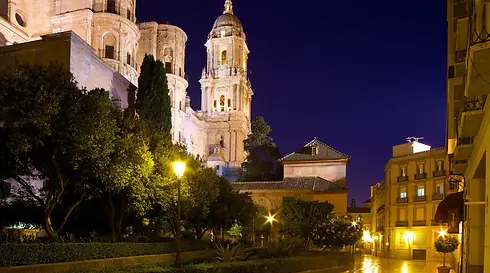
Valencia
Valencia is one of the oldest and most beautiful cities in Spain. It was founded by the Romans in 138 BC and subsequently conquered by the Visigoths and the Moors. The forum and heart of the Roman city were excavated in 1985 and a unique museum was opened right behind the cathedral. So, you can now go for a stroll along the two main roads that used to cross the ancient city. During the Spanish Civil War, Valencia was the capital of Spain for 11 months. Recently it has been named World Design Capital for 2022.
The city is authentic with a rich history and is fast becoming one of the most sought-after destinations in Europe. With 300 days of sunshine a year and an average temperature of 17°, Valencia is a city made for enjoying the outdoors life, especially in Spring and Autumn.
The Holy Grail, the cup from which Jesus drank at the Last Supper is believed to be kept in a chapel inside Valencia’s cathedral.
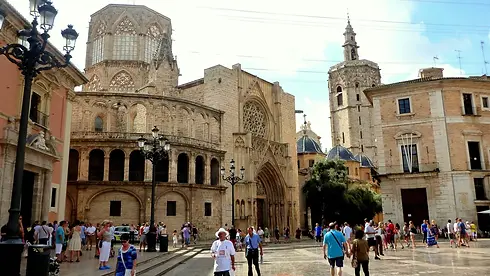
Granada
Granada is a charming city in southern Spain's Andalucia region, located in the foothills of the Sierra Nevada mountains. The city has a rich history, stunning architecture and a vibrant cultural scene. Its main attraction is the Alhambra Moorish palace and fortress, which offers intricate architecture and a glimpse into Granada's past. The Muslims ruled Spain for centuries and the Alhambra is one of the most famous monuments of the historic Islamic world and was the last stronghold before the reclamation of Spain by the Catholic monarchs in 1492. The old town of Granada is the Albaicin neighbourhood, with its narrow cobblestone streets, beautiful views, and traditional bars and restaurants.
Granada's bars are famous for their excellent tapas and a free plate of tapas is offered with every alcoholic drink, so you never need to buy lunch, as long as you are drinking!
The Alhambra and the Albaicin are both designated UNESCO world heritage sites, highlighting the city's historical and cultural significance.

Island of Tabarca
Tabarca is the only inhabited island of the Valencian Community and is located in front of the city of Alicante. The island is a small archipelago, composed, in addition to Tabarca, by the islets La Cantera, La Galera and La Nao. It has an approximate length of 1,800 meters and a maximum width of about 400 meters.
Its shores were once home to a refuge for Barbary pirates. In the eighteenth century, Charles III ordered to fortify and build in it a village in which to house several families of fishermen from Genoa who were captive in the Tunisian city of Tabarka. The walls that surround its urban core have been declared a Historic-Artistic Site and an Asset of Cultural Interest.
Once on the island, visitors can enjoy coves and beaches with transparent waters and a picturesque fishing port, with an excellent offer of restaurants. It is recommended to walk through the urban centre and visit the museum of the island.
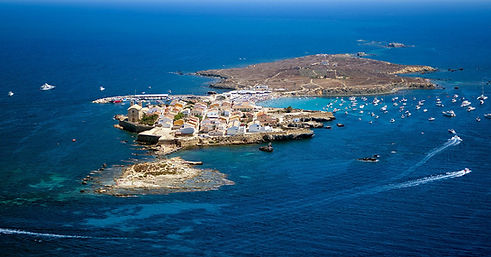
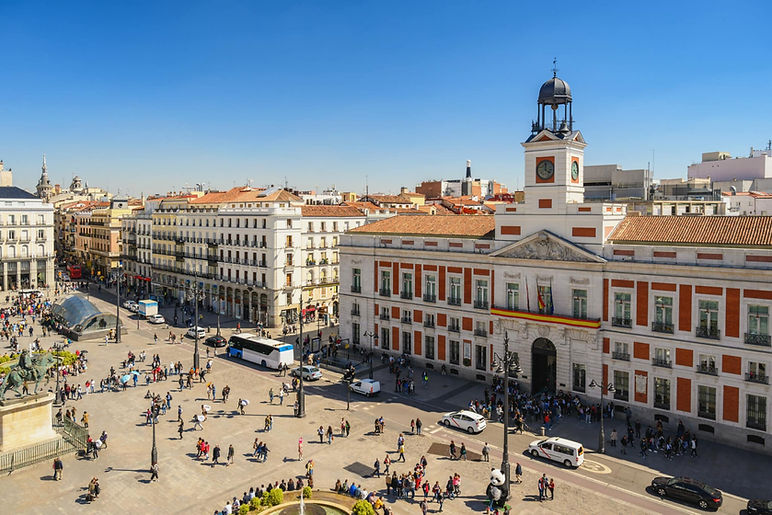
Madrid
Madrid, cheerful and vibrant at all hours, is famous for being an open city with all kinds of people from anywhere in the world.
In addition to its famous museums, busy streets dotted with all kinds of shops, restaurants with world cuisine and unbeatable nightlife, Madrid will surprise you with its tranquil historic spots that charm everyone walking by. Here you'll find traditional family-run, century-old bars where friends meet up for a drink, every style of neighbourhood and cultural centres that offer up an alternative type of tourism. Madrid's authenticity is hard to beat. It is welcoming and diverse. Madrid is, without a doubt, one of Europe’s most interesting cities.
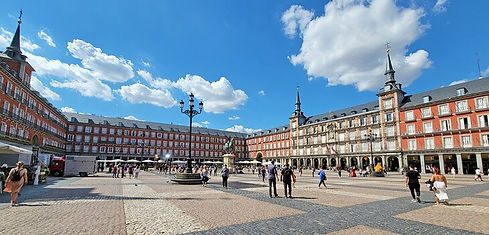
Trip details and Itinerary
Trip details
Booking of flights and accommodation are the responsibility of each individual traveller (links will be provided where necessary and accommodation can be secured if required) as are personal expenses. Travel insurance and complete personal liability for the trips will also be the responsibility of the traveller.
It is anticipated that there will be at least 6 hours of “dedicated” Spanish teaching, comprehension, speaking, learning and discussion, during our morning and afternoon group workshops over three days, Plus, all the ad hoc Spanish practice throughout the whole trip, whilst speaking with taxi drivers, waiters, hotel receptionists, shop keepers etc.
On the final day, we will meet with a local Spanish person or persons in the afternoon for our language exchange. Here, learners will be able to speak or just listen to various lengthy conversations in Spanish. These exercises are a vital part of the learning process.
For the 3 day trip organisation, (am & pm) and Spanish tuition workshops, a £199.00 management and tuition fee for the duration of the trip, is payable per person. This cost is extremely competitive to UK based classroom Spanish lessons, but with the benefit of learning the language in Spain, with a group of like – minded individuals, whilst being fully immersed in the language and the culture.
For logistical purposes, the ideal number of learners per trip would be 15
Typical example for Alicante 3 - Day Itinerary
First evening
After meeting in the hotel reception, the group will visit a local traditional Spanish tapas bar in order to get to know each other. Very little English is spoken by the people who work in the bar and this is your first exposure to real Spain and an opportunity to learn a few Spanish words as we order our food and drinks. The teacher will order everything, but you can listen and learn and of course you can try if you wish.
Day 1 breakfast (first Spanish workshop)
The group will go to a local marina bar for breakfast at 08.30 - 09.00 and to start our first Spanish learning workshop. All learning sheets will be provided, but an A4 pad and pen is required. During this session, that will last for approximately two and a half hours, we will learn how to order our food and drink etc.
Day 1 lunch (second Spanish workshop)...... optional
Lunch on day 1 will be special, as we take a boat trip to the Island of Tabarca, situated just off the coast of Alicante. (subject to sailings and weather etc) We literally pick up the boat adjacent to where we have been having breakfast for the 45 minute journey to the Island. Once on the Island, there will be time for some sightseeing, before we have lunch in one of the several restaurants. We recap the previous session and learn a new set of 20 words and phrases. We leave the Island at 4pm for the journey back to the mainland and we will have free time to explore Alicante if we wish, before meeting for drinks and dinner in one of Alicante's many restaurants. (anyone not wanting to take the boat trip, can stay in Alicante at their own leisure and the work we do on the Island will be provided to them for self study)
Day 1 dinner
We can meet up for drinks before dinner and during the evening, people will be encouraged to try and order drinks and food in Spanish, based on what we have learned already. However, for those that prefer to just listen, this is also very beneficial, as the ability to understand Spanish is just as important in order to have a conversation. No pressure is ever put on anyone to speak, you do it when you feel confident and when you are ready.
Day 2 breakfast (third Spanish workshop)
We meet again at 08.30 – 09.00 this time at a beach bar for our third Spanish workshop. For those that wish, they can order their food and drinks etc in Spanish. This session will be a recap on everything learned so far, before learning another additional content. After breakfast we will have free time to explore Alicante, or perhaps go see the Santa Barbara castle, which is definitely worth a visit.
Day 2 lunch (fourth Spanish workshop)
Lunch on our second day will again be in a marina restaurant and the fourth workshop will follow the same format as previously, but with some translation work added. By this time you will have memorised quite a few Spanish words and phrases and its a great opportunity, for those that wish, to practice using some of their Spanish on the waiters etc. After lunch is free time for sightseeing, shopping or siestas.
Day 2 dinner
Meet for drinks at an agreed time before having dinner at a restaurant chosen by everyone during the day. Again, it is encouraged to try and order drinks and food and try any other basic conversation that anyone feels confident in doing, for example, asking where the toilets are etc. After dinner, people can do as they wish, but it is always fun to stary with the group, who will probably have become friends now.
Day 3 breakfast (fifth Spanish workshop)
Our fifth Spanish workshop will take place in the marina bar right next to the boats. In this workshop we do a recap on everything learned so far, plus we learn a new set of words and phrases and we finish the session with a conversation (from pre written worksheets) that includes all the words and phrases learned so far.
Regarding the brief conversations, utilising the learned words and phrases, they will only be relatively short and not everyone needs to take part if they don’t want to, listening and following the conversation is also very beneficial to the learning process.
Depending on what time the return flight is, there will be free time after breakfast to enjoy the city, shops, beach etc and to practice speaking Spanish with Spanish people that you come into contact with, in bars, shops etc, or even just buying an ice cream, plus the possibility of listening comprehension from the arranged local Spanish people. There will be plenty of opportunity to practice and to learn.
Over the three days, we will have learned many new words and phrases, learned about how grammar works, and the structure of the language and you will learn that it follows a relatively straightforward pattern (in most cases) we will have become very familiar with the most common words and phrases and indeed will have practiced using many of them. We will be able to ask various questions in Spanish and we will understand many responses.
NB: Specific itinerary is anticipated, but can be subject to change based on unforeseen circumstances.
A full and more detailed itinerary is available on request, with photos of all the workshop venues.
4 day trips are priced at: £259.00
Why take an immersion trip to Spain to learn Spanish
Benefits of a Spanish Immersion Trip
Spanish immersion trips to Spain offer a number of benefits for learners of ALL levels. These programmes can help adults improve their language skills, learn about the culture, and connect with other local Spanish speaking people, both in the community and that have been arranged through the language exchange network. Additionally, these programmes can provide a sense of community, comradery and support to all learners in the group, often learning from each other, something you never experience when taking a personal holiday. Also, they provide the opportunity to make friends with like minded people and have fun in the sun doing so.
Immersion trips work, because you’re continuously exposed to the language. Any amount of time spent on Spanish immersion counts because it makes you listen carefully to the rhythms, patterns, and nuances of the language and also encourages you to communicate with it. Like a child learns language, you learn passively as you go, from native speakers
To really take advantage of a Spanish immersion programme, you need to have the right mindset, forget perfectionism, allow yourself to make mistakes, don’t get frustrated if new vocabulary or grammar doesn’t stick. Often we have unrealistic expectations for how fast we should be grasping the language……and remember:
“No matter how many mistakes you make, or how slow you progress, you are still way ahead of everyone who isn't trying” Tony Robbins
Contact Us












